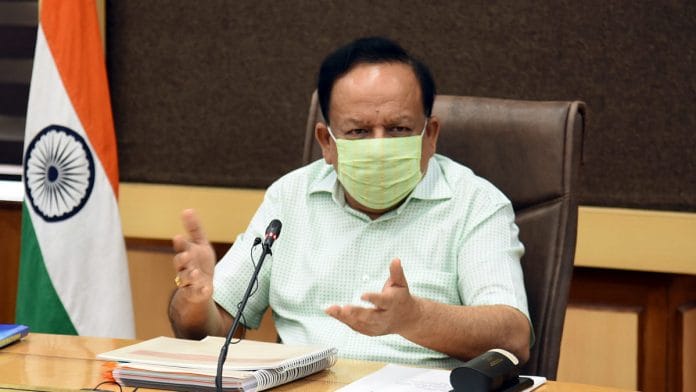New Delhi: In India, 92 per cent of Covid-19 patients got only a mild form of the disease, Health Minister Dr Harsh Vardhan told the Lok Sabha Monday on the opening day of the Monsoon Session.
About 5.8 per cent patients required oxygen therapy and 1.7 per cent needed intensive care, according to Vardhan.
The total number of Covid-19 cases in India stood at 48,46,427 as of Monday, with 79,722 deaths. In the last 24-hour period, 92,071 new cases were reported.
“Many of the epidemiological parameters such as mode of transmission, subclinical infection, period of virus shedding, role of immunity etc. are still being researched. Once a person is exposed to the infection, the disease may develop anytime between 1 and 14 days. The main symptoms of Covid are fever, cough, and difficulty in breathing,” the minister told the House.
“In our country, about 92 per cent of the cases are reported to be having mild disease. In only about 5.8 per cent of cases where oxygen therapy is required and the disease may be severe enough to require intensive care in only 1.7 per cent cases (sic),” he said.
Vardhan also claimed that the 24 March decision to impose the harshest lockdown in the world prevented 14-29 lakh cases and 37,000-78,000 deaths.
An analysis conducted by the Integrated Disease Surveillance Programme some time back had found that 80 per cent of Covid patients in India were asymptomatic.
Dr Harsh Vardhan also said expenditure finance memorandum of Rs 65,560.98 crore under the Prime Minister Atmanirbhar Swasth Bharat Yojana for strengthening the health sector is under consideration. This includes investment in research, healthcare and public health infrastructure, with particular focus on pandemic management.
Also read: Yale study shows coronavirus attacks the brain too, scientists say it’s ‘a silent infection’
Clinical trials
The health minister told MPs that 13 clinical trials of repurposed drugs and harnessing of traditional knowledge using the modern medicine approach are building a portfolio of therapeutic options for Covid-19 patients.
“Phase 2 clinical trial of immunomodulator Sepsivac has been completed successfully. Phase 2 clinical trial of the first-ever phytopharmaceutical ACQH is under way. One prophylactic trial of Aswagandha and three trials of Guduchi + Pippali; Yashtimadhu; and polyherbal AYUSH drug (AYUSH-64) are planned on moderately ill Covid-19 patients,” Vardhan said. Sepsivac in an immunomodulator used for patients who have gone into septic shock.
“Globally, there are around 145 candidate vaccines in preclinical evaluation and currently 35 vaccines in clinical trial. In India, a major focus has been on facilitating the development of Covid-19 vaccine. More than 30 vaccine candidates have been supported which are in different stages of development, 3 candidates are in advanced stage of Phase I/II/III trials and more than 4 are in advanced pre-clinical development stage,” he said.
The Covid-19 Biorepositories have collected more than 40,000 samples for use by researchers developing diagnostics, therapeutics and vaccines.
Focus on non-Covid care
The health minister also spoke about the shift in focus from only Covid to other diseases such as tuberculosis and malaria, which ended up being partially neglected during the lockdown. “We have now moved from ‘managing travel-related cases’ to containing clusters and large outbreaks due to local transmission to wide spread of infection to urban, peri-urban and rural areas. This would require concerted effort by the government with people’s participation to prevent large scale morbidity and mortality,” Dr Harsh Vardhan said.
“Equally crucial is to maintain the success achieved in management of reproductive maternal and child health, vaccine preventable diseases, non-communicable diseases, tuberculosis, vector borne diseases such as Kala Azar and Malaria. Hence, there is an increased thrust for managing non-Covid essential services,” the minister said.
In a communication with the states on 4 September, the Government of India had expressed apprehension that India could be looking at over 5 lakh more TB cases and over 1.5 lakh TB deaths in the next five years because of the transfer of both resources and manpower from the TB control programme to Covid.
Also read: How the world can fight back the fear of a coronavirus vaccine






